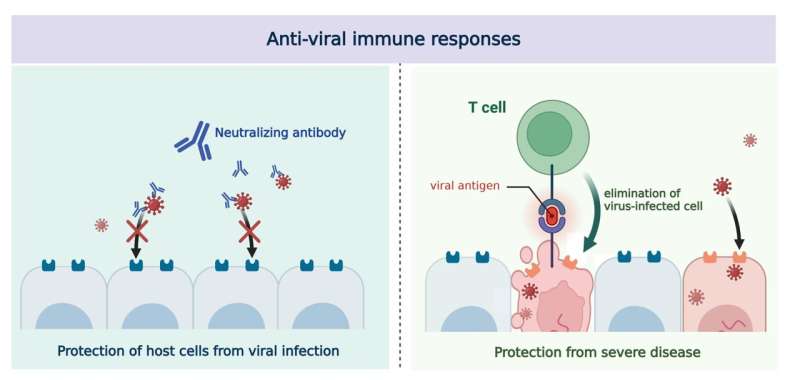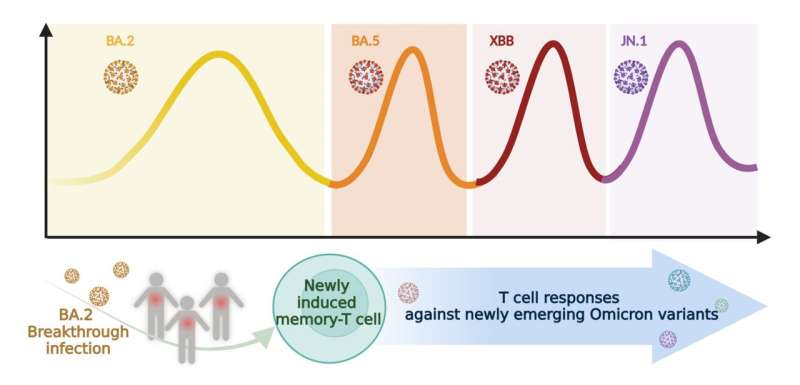This article has been reviewed according to Science X's editorial process and policies. Editors have highlighted the following attributes while ensuring the content's credibility:
fact-checked
peer-reviewed publication
trusted source
proofread
Evolution of the human immune system in the post-omicron era

It has been four years since the start of the COVID-19 pandemic. SARS-CoV-2 has yet to be eradicated and new variants are continuously emerging. Despite the extensive immunization programs, breakthrough infections (infection after vaccination) by new variants are common.
New research suggests that human immune responses are also changing in order to combat the never-ending emergence of new SARS-CoV-2 variants. Specifically, it has been discovered the immune system that encountered breakthrough infection by the omicron variant acquires enhanced immunity against future versions of the omicron. The study is published in Science Immunology.
A team of South Korean scientists led by Professor Shin Eui-Cheol of the Korea Virus Research Institute Center for Viral Immunology within the Institute for Basic Science (IBS) announced that the memory T cells that form during the omicron breakthrough infection respond to subsequent strains of the virus.
Emerging in late 2021, the SARS-CoV-2 omicron variant had drastically increased transmissibility in comparison to its predecessors, which quickly allowed it to become the dominant strain in 2022. New strains of omicron have kept emerging ever since then. Starting with BA.1 and BA2, BA.4/BA.5, BQ.1, XBB strains, and more recently JN.1 strains were among the new strains of the omicron variant. This has led to widespread breakthrough infection despite vaccination.
After becoming infected or vaccinated, the body creates neutralizing antibodies and memory T cells against the virus. The neutralizing antibody serves to prevent host cells from being infected by the virus. While memory T cells cannot prevent the infection, they can quickly search and destroy infected cells, preventing the viral infection from progressing into a severe disease.
The research team's goal was to find out the changes that occur in our body's immune system after suffering from post-vaccination breakthrough infection. In order to answer that question, they focused on the memory T cells that formed after the omicron infection.
The previous studies on the omicron variant have mostly focused on vaccine efficacy or neutralizing antibodies, and the research related to memory T cells has been comparatively lacking.

The research team selected patients who suffered then recovered from BA.2 omicron breakthrough infection in early 2022 as subjects and conducted studies on their memory T cells, specifically in their ability to respond to various omicron variants such as BA.2, BA.4/BA/5, and others.
In order to do so, immune cells were separated from the peripheral blood of the subjects, and the memory T cells' cytokine production and anti-viral activities in response to various spike proteins from different variants were measured.
The results showed that the memory T cells from these patients showed heightened response against not only the BA.2 strain but the later BA.4 and BA.5 strains of omicron as well. By suffering from breakthrough infection, these patients' immune system was strengthened to combat future strains of the same virus.
The research team also discovered the specific part of the spike protein which is the primary cause of the observed enhancement in the memory T cells. These results show that once a person undergoes breakthrough infection by the omicron infection, it is unlikely for them to ever suffer severe COVID-19 symptoms from the future emerging variants.
Research Fellow Jung Min Kyung who led this research stated, "This finding gives us new perspectives in the new era of COVID endemic," adding, "It can be understood that in response to constant emergence of new virus variants, our bodies have also adapted to combat the future strains of the virus."
Director Shin Eui-Cheol of the Center for Viral Immunology commented, "This new finding can also be applied to vaccine development. By searching for common features among the current dominant strain and emerging new strains of viruses, there may be higher chances to induce memory T cell defenses against the subsequent variants."
This research has been conducted in collaboration with colleagues from Yonsei University Severance Hospital, Korea University Hospital, Sungkyunkwan University, and Samsung Medical Center.
More information: Sang-Hoon Kim et al, Omicron BA.2 breakthrough infection elicits CD8+ T cell responses recognizing the spike of later Omicron subvariants, Science Immunology (2024). DOI: 10.1126/sciimmunol.ade6132 , www.science.org/doi/10.1126/sciimmunol.ade6132


















